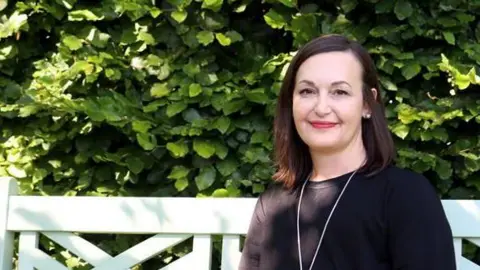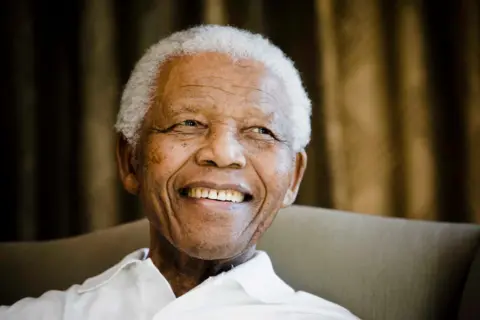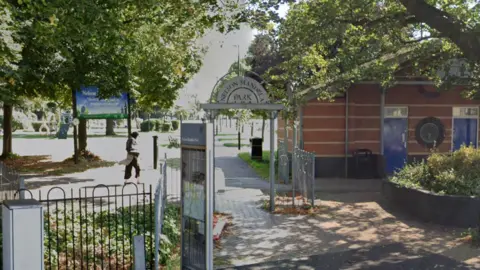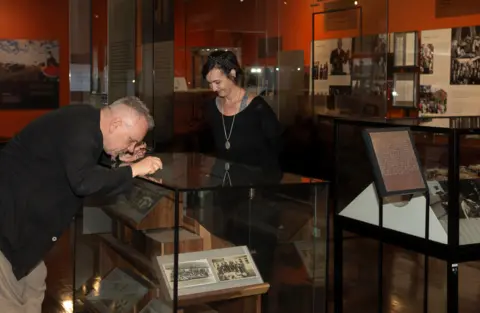Cancer patient found inspiration in unexpected place
 Loughborough University
Loughborough University"It's really scary and you don't know whether there is a light at the end, but things can change."
A woman diagnosed with an aggressive form of breast cancer by chance after a Christmas Eve accident found inspiration in an unexpected place - Nelson Mandela Park in Leicester.
As a South African native, Yolandi Burger was shocked to spot the tribute to her countryman so far from home while riding a bus taking her to Glenfield Hospital's Breast Care Centre in the midst of the pandemic.
Mrs Burger said she "asked the universe for a sign at my time of need, and it gave me a literal park sign" with the inspiring encounter leading to a four-year research project, Named After Nelson.
Growing up, Mrs Burger remembers the end of apartheid and the impact it had on her home country.
She said: "I remember my mum and my dad going to vote.
"I think as kids, we didn't really understand everything that was happening but it was wonderful."

To study design, Mrs Burger had to work to help pay for her studies, at first in a clothes store and then selling jewellery.
But with a lifelong dream to travel, after passing a doctorate in design she was recruited by Loughborough University - and with her husband Everardt and their two-year-old son, the family sold their home and moved to England in March 2020 during lockdown.
"Everything was just closed down," she said. "I remember when we got to Heathrow, there were almost no people.
"We had to isolate for two weeks as well, we didn't meet many people, and I think that also contributed to the loneliness.
"I was teaching with a mask, with my students in masks, behind a screen."
'Everything just shattered'
In December 2020, with Mr Burger back in South Africa until the new year, Mrs Burger was moving a cupboard she had collected for her son's bedroom upstairs when it slipped, hitting her in the chest.
She said: "It was really, really sore so I went to the doctor and we were actually able to pick up one of the smaller tumours just next to the inflammation - so it was absolutely by accident.
"But I don't think it really set in because I was alone with my son at that time.
"You're a mum first, then the rest, so I tried to have a bit of normal until my husband came back in January.
"Once he was there, I think everything just shattered."
Mrs Burger was passed into the care of Leicester Hospitals and while on the way to Glenfield Hospital on a bus, she "did a double take".
 Google Streetview
Google StreetviewShe said: "I was on this bus feeling really, very uncertain about what's going to come next, being probed at, just being scared, and I spotted it.
"It was a warm feeling to spot something that is familiar in a very unfamiliar context. But also it started the question of, why?"
This question, of how places come to be named after someone and what visiting these places teaches people who visit, went on to form the basis of the Named After Nelson research project into places named after Nelson Mandela.
It began formally in 2021 and ends on 31 December with an event at the Nelson Mandela Children's Hospital in South Africa - "from one hospital to another," said Mrs Burger.
 Loughborough University
Loughborough UniversityFrom parks to buildings to hiking trails, physical spaces all over the world named after Nelson Mandela and the meanings they convey were explored for the project.
"For instance, the Nelson Mandela bridge in Johannesburg, is between the lower suburb and business hub," Mrs Burger said.
Its creation literally bridged the gap between a poorer area and their affluent neighbours, "and we were privileged to actually uncover that story".
Now two and a half years in remission, Mrs Burger hopes that with the project coming to an end, it can show people facing similar battles that there are "lifelines" in unexpected places.
She said: "I remember when I was having my chemotherapy, it's really scary and you don't know whether there is a light at the end, but things change.
"Things change a lot. Don't just read the horror stories."
Follow BBC Leicester on Facebook, on X, or on Instagram. Send your story ideas to [email protected] or via WhatsApp on 0808 100 2210.
